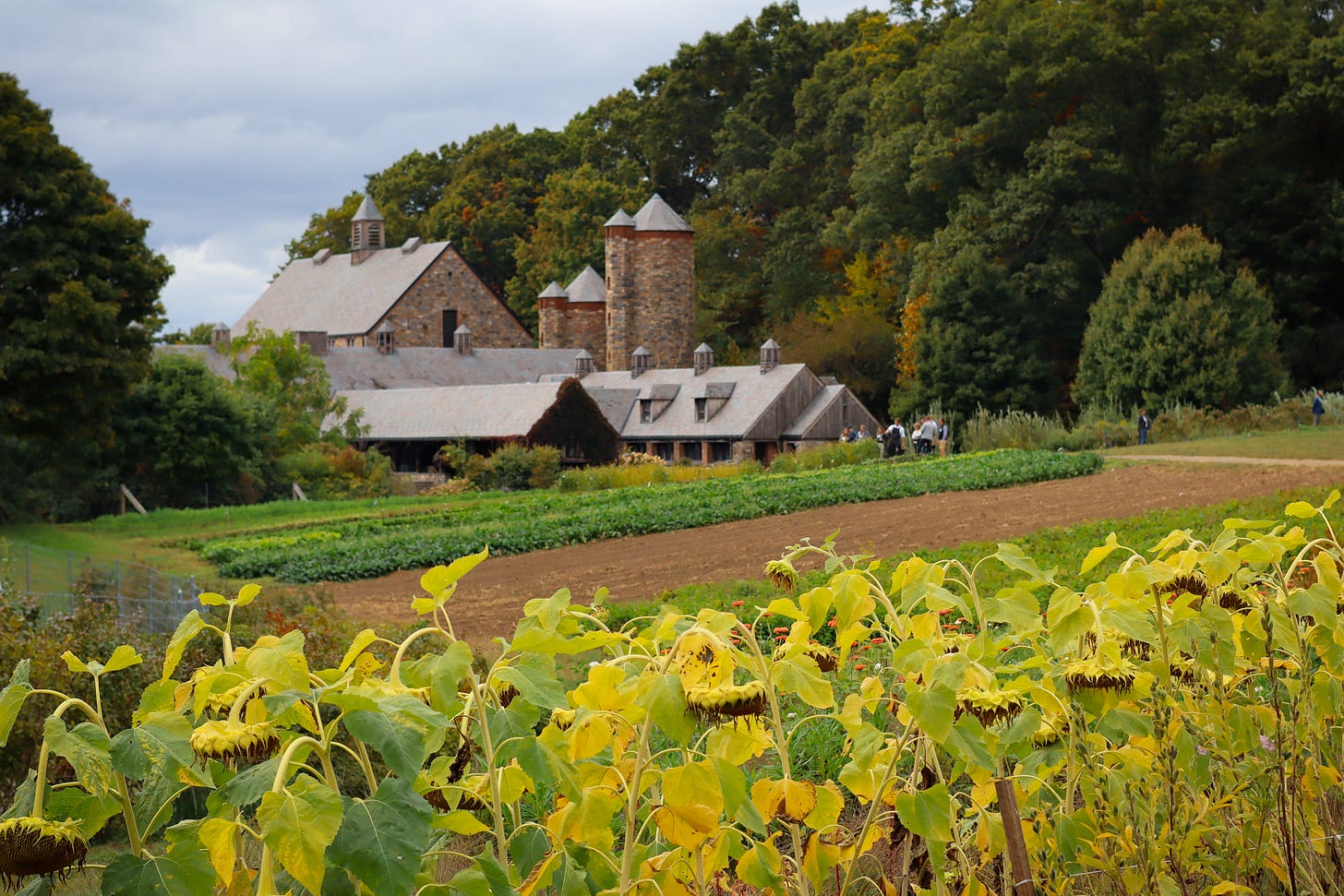Market Signals
14% CAGR in regenerative agriculture: Globally, regenerative agriculture is poised to grow at a 14% compound annual growth rate (CAGR) through 2032 (from $10B in 2023 to $32B by 2032).
$3.1 billion in market size: The market size for farm management software has grown from $2.7 billion in 2023 to $3.1 billion in 2024 (also a 14% CAGR).
$7.7 billion: The USDA announced up to $7.7 billion in assistance for fiscal year 2025 to help agricultural and forestry producers adopt conservation practices on working lands.
From the Trail
Two weeks ago, we hosted our Annual General Meeting at Stone Barns Center for Food and Agriculture outside New York City. After the meeting, our team participated in multiple events throughout New York Climate Week.
Here is one main takeaway and three Trailhead updates from our time in New York.
One main takeaway
Regenerative agriculture adoption is consumer driven. The biggest driver in the 14% CAGR through 2032 (see reference above in Market Signals) is growing consumer demand and awareness. Major food and ag companies are responding; of the top 100 food companies, 68 have established regenerative agriculture initiatives.
At our Annual General Meeting, panelists debated if the activity by major corporations represented a tipping point, or was simply another example of greenwashing (notably, only 18 companies have established quantifiable targets). The next day at Climate Week, Phil Taylor, Co-founder of Mad Agriculture and Trailhead Advisor, mapped out the six principles necessary for greater adoption in regenerative agriculture (which are applicable across all movements in their early stages):
It has to be irresistible for later-stage adopters.
It has to enter cultural spaces. We need to move beyond technocratic solutions into poetry, song, and ritual.
It has to create and share wealth for all.
It needs to connect people with a sense of place.
It has to be done well, with a focus on quality.
It takes community, collaboration, and unexpected allies.
Three Trailhead Updates
Annual General Meeting. We had over 100 attendees join us at Stone Barns for our Annual General Meeting. Check out a gallery of photos here (including of our farm-to-table lunch from Michelin-star chef Dan Barber). Special thanks to our sponsors Morrison & Foerster and PNC.
We released our 2023 Impact Report. Check it out here. Our impact focuses on six types of transformation:
Soil Health: Extractive → Regenerative
Climate Change: GHG Source → GHG Sink
Biodiversity: Collapse → Regeneration
Water: Largest user → Better steward
Human Health: Poison → Food as medicine
Rural Livelihood: Neglect → Vibrancy
Doubling down in 2025: There are multiple factors converging to indicate this is a unique time to invest in regenerative agriculture: the global polycrisis, accelerating adoption of regen ag practices, advanced technology that is better and cheaper, an investor friendly environment, and less competitive markets with available talent for new companies. We see the next few years as an unprecedented opportunity, and we are planning to double-down on our existing strategy. If you’d like to learn more specifics about what 2025 looks like and how you can participate, please reply to this email.
If you missed the AGM or Climate Week, listen to Mark Lewis speaking about how food is medicine at Regen House during Climate Week.
Founder Fundamentals
After Action Reviews. One of the most important skills for early-stage companies is to develop a set of internal practices that generate a high rate of learning. The shorter the learning and iteration cycles, the greater the chance of success. One of the methods we’ve found most effective is the After Action Review. Developed by the US Army in the 1970s, the After Action Review (AAR) is a simple reflection exercise that answers four questions:
What did we expect to happen?
What actually happened?
Why was there a difference between what we expected and what actually happened?
What can we change next time?
Conducting an AAR after a fundraising pitch, a field test, or a hiring process can yield powerful insights that can compound into fewer mistakes and more successful results. A group of researchers in 2023 found that the teams who used AARs most effectively spent 25% of the time on questions #1 and #2, and the remaining 75% of their time on questions #3 and #4. By slightly tweaking the AAR, researchers discovered teams could dramatically improve their effectiveness. In one longitudinal study of a large organization, post-AAR productivity increased by more than 150%. Harvard Business Review.
Portfolio Updates
Eion signed a contract to deliver 8,000 tons of permanent CO2 removal to Microsoft. They were also featured on CNBC (along with Trailhead Capital).
EarthSense won Shell GameChanger funding to unlock large-scale sustainable feedstocks for biofuel production on US commodity farmland.
Provision received the 2024 AgTech Breakthrough Award for data analytics.
CamoAg has signed a partnership with AgCountry Farm Credit Services, Farm Credit Services of America, and Frontier Farm Credit to revolutionize how agricultural data is used in lending and property valuation.
What We’re Reading
How to finance regenerative agriculture. A new report and visual map—with contributions from the Trailhead Team and portfolio—outline a strategic blueprint to finance the regenerative agriculture transition in the Midwest. Transcap Initiative.
Our food system is in crisis. The US food system is facing the “quadruple squeeze.” First, productivity and hunger. Second, the risk to ecosystems. Third, the decline in nutritional density. Fourth, climate change. An essay in The New York Times by David Wallace-Wells. (11 minutes)
Investing in Natural Capital. A report from the World Economic Forum detailed four levers to unlocking capital and nine innovations to support financing for nature (including replenishing the forest microbiome with a profile of Trailhead portfolio company, Funga). World Economic Forum. (55 minutes)
The Local Line Manifesto. Portfolio company Local Line (regional food systems commerce platform) published their manifesto. Local Line. (5 minutes)




